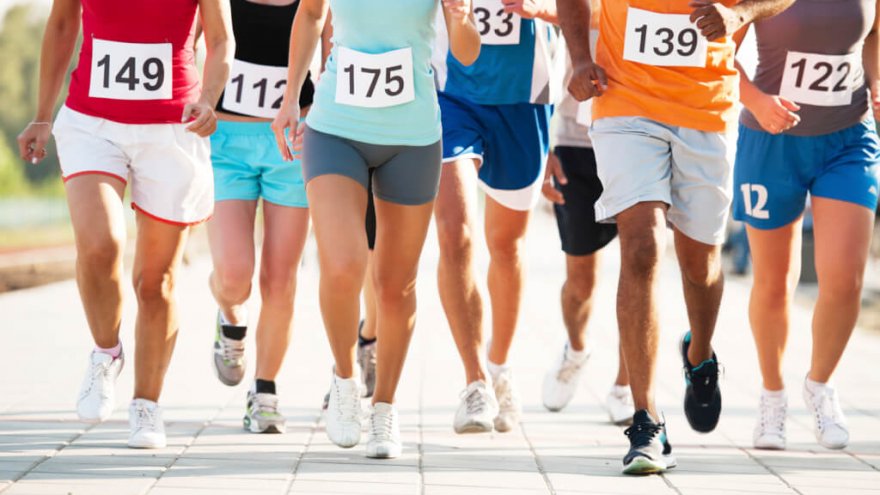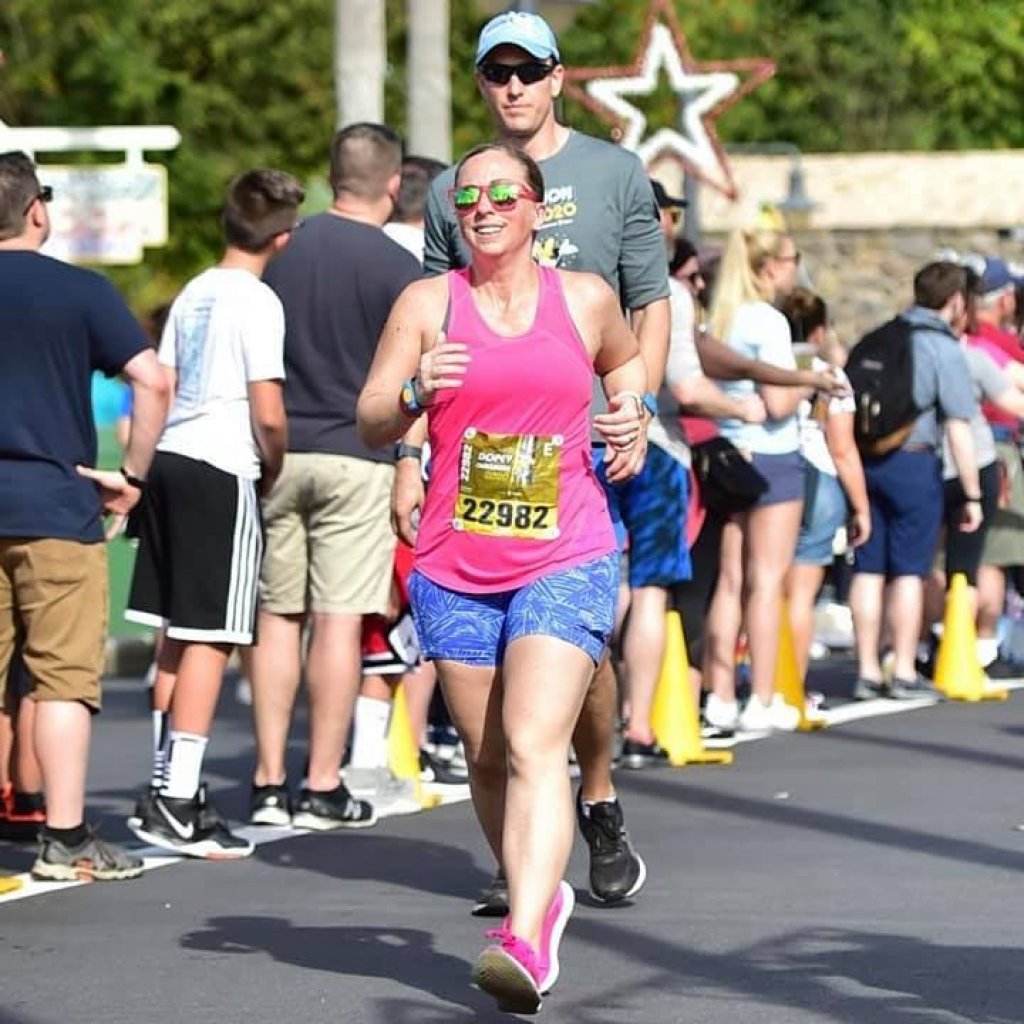Is There a Marathon Runner’s Body Type? (& 7 Keys to Achieve One)

If you started running to see how it could change you, you have probably found so many ways your life has been impacted. Speaking for myself, running has helped my physical and mental health. In addition, it has become an excellent stress reliever.
Running is also a social thing for me, as I have quite a few avid runners friends.
When I decided to register for my first marathon, I was not sure what to expect. Sure, I knew that I needed to commit to 4 months of solid training. I had a good fitness base and was prepared for a long run every weekend. The commitment side of it was not a shock to me.
I was surprised to find that my body changed in interesting ways.

Kim Lations: Lations set a goal for herself to qualify for the Boston Marathon. She ran Sugarloaf in 2018, her 3rd marathon. Although she qualified for Boston, her cushion was not enough to get her registered. In 2019 in Geneva, IL, she ran another marathon where she qualified by a greater margin. Undeterred, Lations ran Chicago in the fall of 2019. Again, she qualified. Although this was enough to get her in, Boston did not happen in 2020.
Lations waited three and a half years to finally run the course in Boston, and in October of 2021, that dream finally came true. As a friend who has witnessed her grow and mature as a runner, I can attest to how the marathon has changed her. She is physically and mentally stronger. She is one of the strongest women I know. No obstacle can sway her from a goal.
What Body Type Do Elite Marathon Runners Have?
If you watch marathons on television, you most likely have a vision in your head of what a marathoner should look like. Top marathon finishers are long, lean, and thin. If you are looking carefully at a shirtless runner or one running in only a sports bra, you will notice defined abdominal muscles.
The leg muscles of a strong marathon runner are also defined and toned, as their legs carry them for many, many miles. On the one hand, their upper body will typically be less defined than the lower body. However, don’t let that lead you to assume that they are not strong.

Jennifer Syslo: “I just ran the Chicago Marathon. I do not have a marathon body. Curves courtesy of 4 kids. This is my second marathon!!”
Why Are Elite Marathon Runners So Thin?
Great question! Professional runners are so skinny because they train for many hours over many miles to build their endurance. Since they burn a lot of calories through their training, they are unlikely to bulk up.
Runners of this caliber also run for a living, so they can also focus on diet to be sure they are properly fueling their bodies with nutritious foods.
Remember: abs are not built in the weight room or gym. Abs are built in the kitchen. If you are wondering about body fat, wonder no more. An elite male runner usually has a body fat of about 7%, with women at around 12%.
According to the American Council of Exercise, the average man is somewhere between 18 – 24 % body fat. As you can imagine, the average woman’s body weight is also far higher than that of an elite runner and varies by age.

Anita Lychman: “Sometimes I see people scan my body when I say I ran marathons (even an ultra-marathon). I acknowledge their scan saying, right-I’m not what you expect a marathon runner to look like.
But, this body has birthed two children, fought cancer, lived almost fifty years, and is strong. Strong enough to train and run those 26.2 miles. Bodies can be surprising, just like people. It turns out mine is resilient and goes the distance!”
How Do Marathon Runners Get Their Bodies?
Marathon runners get their bodies through lots of hard work. But here’s the thing: that body is not always that of an elite runner. If you run 26.2 miles, you’re a marathoner… and that body comes in all shapes and sizes.

Ruth Sellen: “When I first started running, I was trying to lose weight. My fat body has never felt good enough. But running has taught me that my body is capable of amazing things.
Building the strength and endurance to run 26.2 miles is not limited to thin bodies. My body is amazing and beautiful, just as it is. I am no longer trying to shrink myself; I love being a fat runner.”
7 Keys to Building a Marathon Body
There are seven main keys to building your marathon body:
- Base Mileage: You need to build up that base mileage to get strong endurance.
- Long Run: The weekly long run is a very important piece! Don’t neglect these!
- Speed Work: Athletes running their first marathon sometimes cut out this piece, which is okay if you need to. However, if you are shooting for a strong showing, add speed work into your training.
- Core: A strong core helps carry you through when the body starts to fatigue. Trust us on this one.
- Strength: Another component some runners new to the distance don’t add in; consistent strength training is another important piece.
- Nutrition: Those elite runners don’t forget about fueling their body properly, and neither should you.
- Rest: This includes honoring the rest day and also getting enough sleep on a regular basis.

Marie Davis: This 43-year old body ran 31 miles with 3,000’ elevation gain, and beyond endurance and resilience, I learned through my training that our thoughts limit is FAR more than our bodies do.
Marathon Hazards
Although there are many positives, your body will go through when marathon training, there are also pitfalls. You should be prepared for the hell your feet are about to go through.
This can include blisters, broken skin, bruises, and lost toenails. Your feet cannot carry you all of those miles without a cost. That cost can be painful.
Get yourself some body glide or another lubricant to prevent chafe and/or the dreaded bloody nipples. The last thing you need is a painful reminder of your long run.
The day after your long run, you might find it difficult to climb a flight of stairs or even something as simple as getting yourself up off the toilet. I bet you never thought taking a tinkle would actually hurt?
Runners may also find themselves having calf cramps when deep into training. I found that taking a salt tablet helped me to get rid of these.
If you have not figured it out, your body can change in many ways that will be frustrating and even painful. But don’t think that means it won’t be worth it.

Heidi Quero: “My first full was part of the Dopey Challenge in Disney 2020. Approximately 4 months prior to a breast cancer diagnosis. I’m not sure marathon training changed me physically but what I didn’t realize then was that it was 100% preparing me for the challenges that were around the corner.
Marathon training builds grit and mental strength that you can’t really see in photos.”
How Running a Marathon Will Change You
When I registered for my first marathon, I found myself wondering if I could do it. A friend told me I would have many moments doubting if I could run a marathon, but after – I would have a lifetime of knowing I had. Running a marathon will change you. Maybe physically, but certainly mentally.
You will recognize inside of yourself the strength and fortitude you did not know you had. Somewhere out there on the course, when the body gets tired, and the spirit could start to feel weak, you have two choices: you either sit alongside the road and simply stop moving, or you find the grit and determination to keep plugging away. That is the spirit of the marathon.
I can find no better way to wrap this up than by sharing a video by Garmin titled Women of Adventure: Any Body Can Do It. Enjoy!
Latest Articles
 Is Running on a Treadmill Easier Than Running Outside?Runners have their own preferences, whether it is treadmill running, running outside on the road, or exploring trails. So...
Is Running on a Treadmill Easier Than Running Outside?Runners have their own preferences, whether it is treadmill running, running outside on the road, or exploring trails. So... Is It OK to Use Trail Running Shoes on the Road?While trail running shoes can be used on roads, especially in situations where a runner encounters mixed terrains or pref...
Is It OK to Use Trail Running Shoes on the Road?While trail running shoes can be used on roads, especially in situations where a runner encounters mixed terrains or pref... How to Fix Sore Quads After Running?Rest, ice, gentle stretching, and over-the-counter pain relievers can help soothe sore quads after running. Also, ensure ...
How to Fix Sore Quads After Running?Rest, ice, gentle stretching, and over-the-counter pain relievers can help soothe sore quads after running. Also, ensure ... 10 Fruits With The Most Electrolytes to Replace Sports DrinksThese fruits are high in electrolytes such as potassium, magnesium, and calcium, essential for hydration, muscle function...
10 Fruits With The Most Electrolytes to Replace Sports DrinksThese fruits are high in electrolytes such as potassium, magnesium, and calcium, essential for hydration, muscle function...

